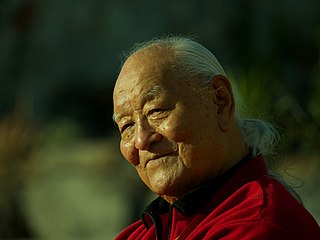A Quote by Muhammad Iqbal
It may, however, be said that the level of experience to which concepts are inapplicable cannot yield any knowledge of a universal character, for concepts alone are capable of being socialized.
Related Quotes
I view all art as an effort to translate brain concepts into a work. These brain concepts are synthetic ones - the result of many experiences. But a single work of art, or even a series of works, more often than not cannot translate these synthetic concepts adequately. Yves Saint Laurent once said that he suffered greatly when creating. He is not alone in that. Most artists do the same and say as much.
Duality is the real root of our suffering and of all our conflicts. All our concepts and beliefs, no matter how profound they may seem, are like nets which trap us in dualism. When we discover our limits we have to try to overcome them, untying ourselves from whatever type of religious, political, or social conviction may contain us. We have to abandon such concepts as 'enlightenment', 'the nature of the mind', and so on, until we no longer neglect to integrate our knowledge with our actual existence.
The experimentalists think that we can only get at our concepts by way of empirical investigation, while the armchair philosophers think that we can skip the experiments and figure things out from our armchairs. What they have in common, however, is regarding our concepts as the targets of philosophical theorising, and I just don't think that, in the vast majority of cases, the subject matter of philosophy has our concepts as its target.
Every morning I'd have coffee with my wife and we would discuss ideas. Sixty percent of what I did for the stores was concepts. The other forty percent was correcting and cleaning up other concepts in house, or doing final art on my concepts. Most of my concepts were so finished they could turn them over to somebody else.
I think that a lot of things are hard to read if you're not in the vocabulary flow of that particular discourse. I sometimes forget that even though the words I'm using are fairly ordinary words, the concepts around which they cluster, which are the long concepts of literary tradition, may not be familiar to an audience.
I say that creeds, dogmas, and theologies are inventions of the mind. It is the nature of the mind to make sense out of experience, to reduce the conglomerates of experience to units of comprehension which we call principles, or ideologies, or concepts. Religious experience is dynamic, fluid, effervescent, yeasty. But the mind can't handle these so it has to imprison religious experience in some way, get it bottled up. Then, when the experience quiets down, the mind draws a bead on it and extracts concepts, notions, dogmas, so that religious experience can make sense to the mind.
A work of art rests its merits in traditional qualities. It may constitute a remarkable feat in craftsmanship; it may be a searching study of psychological states; it may be a nostalgic glance backward; it may be any one of an infinite number of concepts, none of which may have any possible bearing upon its degree of newness.
One of the most revolutionary concepts to grow out of our clinical experience is the growing recognition that innermost core of man's nature - the deepest layers of his personality, the base of his 'animal nature' - is basically socialized, forward-moving, rational and realistic... He is realistically able to control himself, and he is incorrigibly socialized in his desires. There is no beast in man, there is only man in man.






































